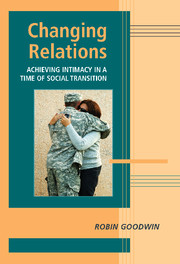Book contents
- Frontmatter
- Contents
- Foreword by Daniel Perlman
- Acknowledgements
- 1 The Nature of Social Change
- 2 The Myth of Modernisation?
- 3 More Beautiful than a Monkey: The Achievement of Intimacy
- 4 Friends and Social Networks
- 5 Sex and the Modern City
- 6 Marriage and the Family
- 7 Modelling Social Change and Relationships
- References
- Index
- OTHER BOOKS IN THE SERIES
5 - Sex and the Modern City
Published online by Cambridge University Press: 21 October 2009
- Frontmatter
- Contents
- Foreword by Daniel Perlman
- Acknowledgements
- 1 The Nature of Social Change
- 2 The Myth of Modernisation?
- 3 More Beautiful than a Monkey: The Achievement of Intimacy
- 4 Friends and Social Networks
- 5 Sex and the Modern City
- 6 Marriage and the Family
- 7 Modelling Social Change and Relationships
- References
- Index
- OTHER BOOKS IN THE SERIES
Summary
While sexual relationships are, of course, a feature of all societies, the appropriateness of sexual behaviours varies a great deal over time and place (Goodwin & Cramer, 2002). Societal prohibitions can influence the performance of State-controlled actions, such as the abolition of abortion in State hospitals in Romania under Ceauşescu, whilst other proscribed behaviours, such as homosexual practices, will persist despite being officially forbidden. Particular societal conditions, such as extreme economic deprivation, may change behaviours in previously unimagined ways, with, for example, “respectable” individuals turning to prostitution to provide for themselves and their families. Other environmental factors, such as cramped living conditions, can greatly reduce the opportunities for privacy and can severely stress a couple's intimate relationships (Einhorn, 1993; Honig & Hershatter, 1998). One important aspect of the way in which people think about their families and sexual relationships has been the impact of mobility. Migrants are often exposed to the possibilities of high-risk sexual behaviours (Wellings et al., 2006). In Eastern Europe, Hillhouse (1993) argues that migration reduced traditional social controls and allowed premarital sexual behaviour to be more openly acknowledged. American children change residences more frequently than children in other industrialised countries (South, Haynie, & Bose, 2005). South et al. discuss residential mobility in the United States as a moderator of adolescent sexual activity. Drawing on the National Longitudinal Study of Adolescent Health, which questioned more than 90,000 adolescents in grades 7 to 12, they found that recently mobile adolescents were more likely to initiate sexual activity than nonmobile ones.
- Type
- Chapter
- Information
- Changing RelationsAchieving Intimacy in a Time of Social Transition, pp. 95 - 113Publisher: Cambridge University PressPrint publication year: 2008

